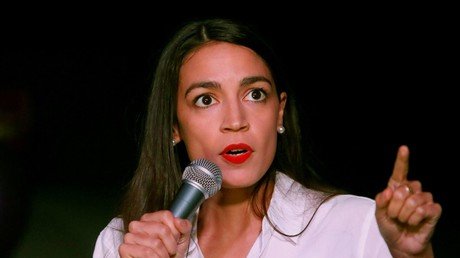WikiLeaks betting ‘$1mn & editor’s head’ against Guardian claims that Manafort met Assange
After the Guardian released an anonymously-sourced report on Trump campaign manager Paul Manafort’s alleged meetings with Julian Assange, Wikileaks says it was asked for comment, but its denial was not included in the article.
The report by Guardian’s Luke Harding, which is light on relevant details and based on unnamed “well-placed sources,” claims that Manafort, who managed US President Donald Trump's 2016 campaign and is currently in jail on related charges, met with Wikileaks co-founder Julian Assange three times during Assange’s ongoing exile in the Ecuadorian Embassy in London.
The article says it’s unknown what the two supposedly discussed, but hints heavily that it was related to Russia’s alleged interference in the election – namely the leak of the Democratic National Committee (DNC) emails. Those documents were “stolen by Russian intelligence officers,” the Guardian claims.
BREAKING: @WikiLeaks publisher Julian Assange has instructed his lawyers to sue the Guardian for libel over fabricated Manafort story and launched a legal fund to boost the action https://t.co/VaoMESN5RO
— WikiLeaks (@wikileaks) November 27, 2018
As such, Harding writes, the meetings could be of interest to FBI Special Counsel Robert Mueller, who has been trying and failing to find definitive proof of Trump’s supposed “collusion” with Russia.
Except the meetings didn’t happen, Wikileaks says. The whistleblowing website is so adamant about this, it’s willing to bet “a million dollars and its editor’s head” on it.
Remember this day when the Guardian permitted a serial fabricator to totally destroy the paper's reputation. @WikiLeaks is willing to bet the Guardian a million dollars and its editor's head that Manafort never met Assange. https://t.co/R2Qn6rLQjn
— WikiLeaks (@wikileaks) November 27, 2018
Moreover, Wikileaks has posted a screenshot of what it says is Harding’s request for comment it received hours before the Guardian’s publication. Comment was given but not included, it says.
SCOOP: In letter today to Assange's lawyers, Guardian's Luke Harding, winner of Private Eye's Plagiarist of the Year, falsely claims jailed former Trump campaign manager Paul Manafort had secret meetings with Assange in 2013, 2015 and 2016 in story Guardian are "planning to run". pic.twitter.com/ZEw7Hjwtki
— WikiLeaks (@wikileaks) November 27, 2018
The "Guardian"'s Luke Harding wrote to former lawyer Melinda Taylor just hours before publication. WikiLeaks then tweeted Harding's email publicly, outing the "Guardian"'s fake news disaster prior to publication. The "Guardian" didn't include the denial and ran regardless.
— WikiLeaks (@wikileaks) November 27, 2018
Over an hour after publication the Guardian article was updated to include Wikileaks’ reaction. Whether Harding’s anonymous sources will ultimately win against the whistleblowers’ all-in bet remains to be seen.
Which is true? The Guardian's anonymous claims or WikiLeaks' vehement denials? You can pick which to believe based on which one most advances your political narrative, or refrain from forming judgments until evidence is available. I'm going to opt for the latter course: pic.twitter.com/V0Ddpd4Mvf
— Glenn Greenwald (@ggreenwald) November 27, 2018
Several hours after wagering 1 million greenbacks that the story was a fraud, WikiLeaks noted that the Guardian had made edits to its original story, attributing the scoop to “sources” and drizzling the text with less certain-sounding language.
For example, the sentence “Why Manafort sought out Assange in 2013 is unclear,” was changed to “Why Manafort might have sought out Assange in 2013 is unclear.”
Guardian quietly edits itself away from completely fabricated blockbuster "Manafort visited Assange at embassy" story. Expect more changes. Will editor @KathViner resign? https://t.co/JgEXSTXFzgpic.twitter.com/93mdLRtncb
— WikiLeaks (@wikileaks) November 27, 2018
@KathViner We're going to charge 10% interest, compounding, on the $1.000.000 and publish a new figure every week until the Guardian pays up and you resign. pic.twitter.com/gctUS32Hl2
— WikiLeaks (@wikileaks) November 27, 2018
WikiLeaks called the changes “back-pedalling” on a “100% fake” story and, provocatively, asked if the paper’s editor-in-chief, Katharine Viner, would resign.
Subscribe to RT newsletter to get stories the mainstream media won’t tell you.














